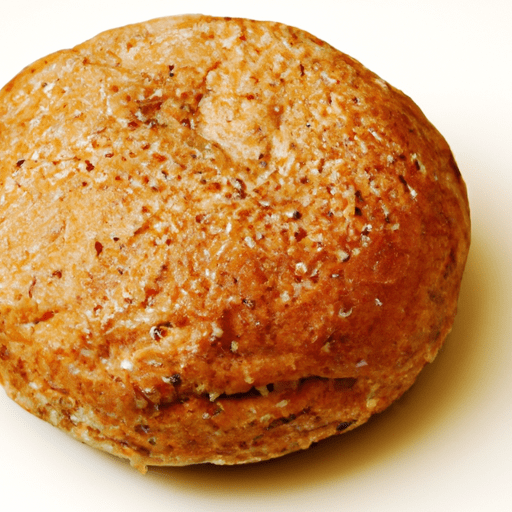The Delicious World of Whole Wheat Hamburger Buns
When it comes to burgers, the bun plays a crucial role in elevating this quintessential comfort food to the next level. While the traditional soft and squishy white bun may be the go-to choice for many, whole wheat hamburger buns are a tasty and nutritious alternative that deserves some culinary attention. In this blog post, we will dive into the wonderful world of whole wheat hamburger buns, exploring their taste, common uses in cooking, nutritional value, and some fascinating facts for you to sink your teeth into.
Taste and Texture
Whole wheat hamburger buns offer a slightly nutty and earthy flavor that adds depth to your favorite patties. Unlike their white counterparts, whole wheat buns have a heartier and denser texture, giving your burgers a satisfying bite. Don’t be fooled, though – while they may be sturdy, these buns still possess a tender and moist crumb that holds up well to the juiciest of fillings.
Common Uses in Cooking
Whole wheat hamburger buns are an incredibly versatile ingredient that can bring some wholesome goodness to a variety of dishes. Of course, they are perfect for serving your homemade burgers, whether they are beef, turkey, or veggie-based. But don’t limit yourself to just burgers! These buns can be used to create delicious sliders, pulled pork or chicken sandwiches, falafel burgers, or even as a vessel for mouthwatering barbecue treats. The whole wheat flavor will enhance the overall taste experience, providing a delightful twist to your favorite recipes.
Nutritional Value
Whole wheat hamburger buns are not only flavorsome but also pack a nutritional punch. They are an excellent source of fiber, providing more nutrients than their refined white counterparts. Packed with essential vitamins and minerals, such as B vitamins, magnesium, and selenium, they contribute to a well-balanced and wholesome meal. Additionally, the fiber content aids digestion and helps keep you feeling satisfied for longer, making whole wheat buns a perfect choice for those seeking a healthier alternative.
Interesting History and Facts
Whole wheat as a grain has been cultivated for thousands of years, dating back to ancient civilizations in the Middle East and Europe. The refinement of wheat flour became prevalent during the industrial revolution, but as people began to prioritize health-conscious choices, whole wheat products made a comeback. Today, whole wheat hamburger buns are a popular choice for health-conscious burger aficionados who don’t want to compromise on taste.
While whole wheat buns gained recognition for their nutritional benefits, they have also caught the attention of food enthusiasts and artisan bakers. Many bakeries now dedicate themselves to perfecting the art of crafting whole wheat buns, experimenting with different flour blends and adding unique twists to elevate the taste and texture.
Conclusion
Whole wheat hamburger buns offer a delightful change from traditional burger buns, bringing a nutty flavor, robust texture, and a host of nutrients to your meal. Their versatility in the kitchen opens up a world of possibilities for creating delicious and health-conscious burgers, sandwiches, and sliders. So, next time you fire up the grill or experiment in the kitchen, give whole wheat hamburger buns a try – your taste buds and body will thank you!
Note: Before making any dietary changes, consult a healthcare professional.
Whole Wheat Hamburger Buns
Origin: Whole wheat hamburger buns are an adaptation of the traditional white hamburger buns. Whole wheat flour, which is made from grinding the whole grain of wheat, is used instead of refined white flour to make the dough.
Common Uses: Whole wheat hamburger buns are primarily used as a bread roll for making hamburgers and sandwiches. They provide a more wholesome and nutritious option compared to regular white buns.
Nutritional Benefits: Whole wheat hamburger buns offer several nutritional benefits compared to their white counterparts:
- Higher Fiber Content: Whole wheat flour contains more dietary fiber than refined white flour. This fiber aids digestion, helps maintain a healthy weight, and may reduce the risk of certain diseases.
- More Micronutrients: Whole wheat flour tends to retain more vitamins and minerals, such as B vitamins, iron, and magnesium, due to its minimal processing.
- Lower Glycemic Index: Whole wheat products generally have a lower glycemic index compared to refined flour products. This means that whole wheat hamburger buns provide a slower and steadier release of glucose into the bloodstream, which can help manage blood sugar levels.
Unique Properties and Historical Significance:
- Whole wheat hamburger buns have a denser texture and nuttier flavor compared to regular hamburger buns, due to the presence of bran and germ in the whole wheat flour.
- Including whole wheat buns as an alternative to white buns offers consumers a healthier and more nutritious option.
- There is a growing awareness of the benefits of whole wheat over refined grains, leading to increased demand for whole wheat hamburger buns in recent years.
- The use of whole wheat flour in various baked goods, including hamburger buns, has its roots in older traditions and the belief that consuming whole grains is essential for good health.
Please note that while whole wheat hamburger buns are generally considered a healthier choice, the overall nutritional profile may vary depending on the specific ingredient list and preparation method used by different manufacturers.




Use the share button below if you liked it.
It makes me smile, when I see it.